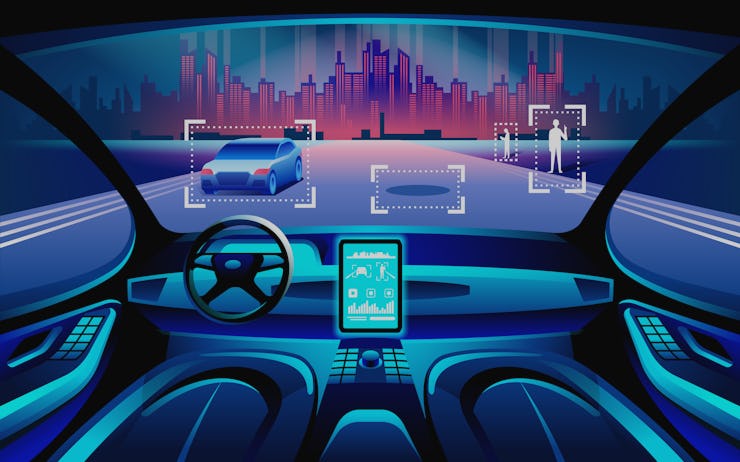Robot taxis could solve a crucial Covid-19 problem
Ready or not, here they come.

For years, self-driving cars have been stuck between being inevitable and never materializing in our daily lives. But a new push for robot taxis in China as a potential social distancing measure post-Covid-19 could finally be the push these vehicles need.
The company in question is Didi, a Beijing-based ride-hailing company similar to Lyft or Uber. Didi announced on Tuesday its plan to introduce one million self-driving, robot taxis to its fleet by 2030. The move fits a pattern of Didi's, which has tip-toeing into the world of self-driving vehicles by the company in recent years. In 2019 the company began trials of its self-driving vehicles in Shanghai, Beijing, and Shenzhen. The company says that these vehicles would help transport commuters in areas were ride-sharing is sparse.
The public has historically had little trust for self-driving cars, but as commuters look for socially-distant alternatives to travel, self-driving robot taxis may suddenly have a new appeal.
While it's not yet clear how Didi's new fleet of self-driving cars will operate, that it is investing in the creation of new self-driving vehicles for these fleet already separates it from the robotaxis that Tesla CEO Elon Musk has teased.
Instead of creating a new fleet of cars specifically designed to be robot taxis, Tesla's "Tesla Network" would work by essentially borrowing customers' cars when it's not in use and using it as a self-driving chauffer for commuters in the area. This plan would allow owners of the vehicles to set the parameters of their car's side hustle (such as only being able to pick up family or social media friends and only during certain hours of the day) and would allow them to pay back the cost of their Tesla with the fares their vehicle collected.
Self-driving vehicles have made appearances recently on shows like HBO's Westworld or Amazon Prime's Upload, but in reality the release of these vehicles has been staggered and not always successful.
At Tesla's 2019 Autonomy Day conference, Musk said it was like "a combination of the Uber or Airbnb model.”
But there's some crucial fine print to this arrangement: Tesla will still take 25 to 30 percent of revenue earned from the taxi rides, meaning you'd pay to own a Tesla and then make money for the company while attempting to pay-off your Tesla.
Despite promising during the same conference that Tesla's robotaxis would be partially operational by 2020, Tesla is still working towards its goal of total autonomy for its vehicles.
Meanwhile in China, testing appears to be more successfully underway for Didi as well as companies like WeRide and Baidu, both of which have moved beyond simple testing and have started offering limited robot taxi service in the southern cities of Guangzhou and Changsha respectively.
Regardless of whether the shared Tesla model or Didi's seemingly more traditional taxi cab model wins out in the battle of the robot taxi, it will be paramount for both models to offer patrons not only peace of mind about the A.I. behind their ride but also to offer peace of mind about the cleanliness of the ride as well.
It's hard enough to trust that your self-driving car won't kill a pedestrian -- or you. Are we ready to trust them with Covid-19 too?
It certainly helps that self-driving cars, by their very nature and name, are not driven by another person and thus have a built-in social distance. But this also means that there is not necessarily a human on hand who can readily disinfect vehicles between passengers.
Lucky for these robot taxis, this is a problem that tourist locations like hotels have already blazed a trail for with air purifiers and UV light blasting robots.
There's no straight path forward for self-driving cars or Covid-19 protections. But as Didi prepares to massively ramp up its fleet of cars in the next decade, solutions to these problems are likely to reveal themselves -- one way or another.